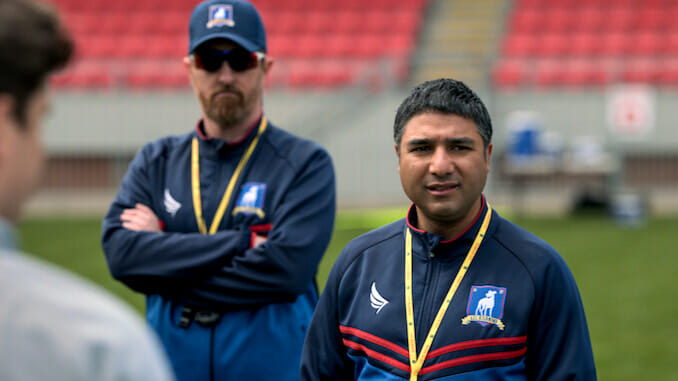Why the Ted Lasso Season 2 Finale Leaves a Bitter Taste
Photo Courtesy of Apple TV+

Apple TV+’s Ted Lasso is one of the most generally heartwarming shows on television. Watching it can often feel like cuddling up with a cozy blanket, escaping into a world where everyone’s making good choices and constantly evolving into the best version of themselves. Yes, the idea of a kindhearted American coach who forges a squad of squabbling young soccer players into teammates and friends using little more than folksy platitudes and dad jokes may seem ridiculous on its face. But the result is one of the best shows on television, an unabashedly hopeful tale that openly embraces kindness, compassion, and vulnerability in a world that too often encourages us to reject those traits to get ahead. And yet, a big part of its Season 2 finale, “Inverting the Pyramid of Success,” went a different way.
Part of the overall brilliance of Ted Lasso is the way it constantly plays with its audience’s expectations about what kind of show it is and what sort of story it’s telling. On almost any other series, Ted himself would be the butt of the joke, an embarrassing cautionary tale about uncouth Americans who hate tea and embarrass themselves when visiting foreign countries. Instead, this show asks us all to become more like him, urging us to embrace his open-hearted emotion and intellectual curiosity with both hands.
One of the reasons why “Inverting the Pyramid of Success” was ultimately so rough, though, is because in Ted Lasso’s world the locker room is a place of emotional growth and understanding, rather than a refuge for toxic masculinity and crass language. Rich friendships between men are the established norm rather than the exception, and the series’ women are allowed to have just as big a role in this supposed “sports story” as the men around them do. Things like communication, forgiveness, and camaraderie are paramount, and the least important thing about the show is whether the AFC Richmond Greyhounds (the ostensible reason for its existence) ever actually win a game.
Nathan Shelley, AFC Richmond’s put-upon equipment manager, was the heartwarming underdog of Season 1. Bullied and put down by most of the players he cleaned up after week in and week out, Nate remained sweet and kind whether the team won or lost. He was one of the first people who took Ted seriously as the Richmond coach, offering advice and background information to help him succeed. He earns the nickname “Nate the Great,” and the two men seemed to become genuine friends in addition to being colleagues.
So how did we get to the point—less than a season later!—where Nate has not only revealed a deeply personal secret about Ted’s mental health to the British press, but seems to feel basically zero guilt for doing so? How did we all so thoroughly miss his complete descent into utter terribleness and wankery? Am I a moron for ever believing that there was something larger at work here than just a weak man being corrupted by his first taste of power and popularity?
Nate justifies his anger at Ted in the most childish way possible, claiming that his actions are acceptable simply because his boss is not paying enough attention to him anymore. His insistence that Ted has somehow abandoned him because he, I don’t know, decided to do literally anything other than feed his assistant’s apparently bottomless ego for five minutes lands like a live grenade. I’m not sure there’s been a more uncomfortable scene this season than the one in which Nate declares he has earned his place at Richmond while Ted, who has demonstrably changed the team’s culture for the better, has not. Unless it’s the scene that immediately follows, in which a glowering Nate appears to be openly hoping his team will lose, even as Jamie selflessly allows Dani Rojas to step forward and save the day while exorcising his dog-killing demons from earlier in the season at the same time. This self-proclaimed Wonder Kid could never.